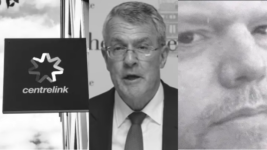If the RoboDebt Internal Whistleblower Had Gone Public, She’d Likely Be Criminally Prosecuted

Conducted in relation to referrals made by the Royal Commission into Robodebt, the Australia Public Service taskforce inquiry report into the failed automated debt recovery scheme targeting social security recipients was released last Friday, and it outlined that 12 former and current public servants and agency heads had breached the APS Code of Conduct on 97 occasions in relation to Robodebt.
However, only four of those identified will face sanctions, as they’re still in APS employment. And taken together with the June decision of the National Anti-Corruption Commission (NACC) not to investigate six senior public officials in relation to Robodebt, it appears that any solid justice in respect to the scheme that sent out false debt demands to the public won’t be forthcoming.
In relation to the slap on the wrist the APS inquiry findings are likely to result in, The Guardian spoke to former Centrelink compliance officer Colleen Taylor about how she blew the whistle internally to then Human Services secretary Kathryn Campbell in 2017. And while Taylor went into forensic detail in her reporting on how the scheme was failing, she considers it wasn’t dealt with appropriately.
Unlike other APS whistleblowers of the time, Taylor appears not to have raised her concerns with a higher authority, such as an ombudsman, and nor did she go to the press with this information, as public service employees are encouraged to do so within the framework of the Public Interest Disclosure Act 2013 (Cth), which protects public disclosures following failed internal complaints.
Robodebt caused two suicides and likely more. It began in 2015 and was brought to an end in late 2019. So, if Taylor had gone to the press with evidence, it may have finished the harmful policy earlier.
But if she’d taken this “protected” path to expose the truth, she’d potentially also be looking at criminal charges, as that’s the justice the Commonwealth has been serving whistleblowers.
Proving the point is criminal
Under similar circumstances to Taylor, former ATO whistleblower Richard Boyle decided to blow the whistle to the ABC in early 2018, in regard to an internal public interest disclosure he’d made about a breach of policy that saw tax officers recovering debts directly from small business accounts without notice earlier than permitted in order to make end of financial year figures look impressive.
Boyle was later raided, arrested and charged with 66 criminal offences relating to having gone to the press to expose the corrupt practice. However, after arguing his public interest disclosure defence, the South Australian District Court found that, under the terms of the PID Act, he was protected in going to the press and exposing the practice.
But Boyle is still facing trial over 24 charges due to the preparatory acts that he took in putting together his public interest disclosure, which involved evidence gathering in terms of taking photos of taxpayer information, covertly recording conversations he’d had with ATO colleagues and uploading taxpayer information to his lawyer’s email account, which was deliberately not accessed.
Indeed, the SA Court of Appeal confirmed this finding in June this year, as it outlined that the provision of “civil, criminal and administrative liability” that section 10 of the PID Act provides to whistleblowers that take the prescribed route set out in the federal legislation does not extend to preparatory acts. Therefore, Boyle’s acts of building his disclosure are considered criminal.
The other key point about Boyle’s case that the recent Guardian article on Robodebt has relevance to is that the ATO garnishee practice that Boyle exposed as being corrupt was brought to an end after he brought light to it, and several inquiries went on to find that it was being applied unlawfully, which means if the truth of Robodebt had been revealed earlier, it too may have stopped.
The Guardian article further suggests that the Centrelink internal whistleblower provided forensic evidence, which could have involved evidence gathering and preparatory acts to make a point internally. And if Taylor had decided to go to the press at that point, it would be quite reasonable for her to consider she could take that same evidence to the media due to the PID Act immunities.
Protected in the future
As the 2016 Moss report into the Public Interest Disclosure Act reveals it was enacted with bipartisan support based on a body of research that regards “whistleblowers and complaints as an opportunity for organisations.” However, over a decade later, it would appear that government agencies continue to consider whistleblowers as individuals who should be suppressed and punished.
Under attorney general Christian Porter, the government launched three significant whistleblower prosecutions in 2018 against ASIS whistleblower Witness K, former ADF lawyer David McBride and ex-ATO officer Boyle, which appeared like a crackdown. And today, Witness K has served the suspended sentence imposed upon him, whilst McBride is serving time inside awaiting an appeal.
And as for Boyle, he recently narrowly avoided standing trial on 5 September in relation to the 24 criminal offences laid against his name, as he’s sought special leave to appeal the outcome of his public interest disclosure case to the High Court, which could result in that court finding the ambiguously set out section 10 criminal immunity actually does protect preparatory acts.
Current attorney general Mark Dreyfus drafted the PID Act during an earlier stint as the nation’s chief lawmaker in 2013. And he was elected to office in May 2022, after having promised in opposition the year prior, to overhaul the PID Act regime as it had been failing all three whistleblowers, as well as Witness K’s co-accused, his government-approved barrister Bernard Collaery.
Dreyfus passed an initial round of PID Act reforms in June last year, in order to facilitate the running of the NACC, whilst he’s currently contemplating a second major overhaul of the legislation, with a consultation paper having been released late last year, which outlines that the types of preparatory acts that Boyle is facing prison over could have criminal immunity extended to them.
This means that a revamped PID Act could protect those in Boyle’s position in the future, and it begs the question as to why the attorney general doesn’t drop the case against him, as he did in regard to the prosecution against Collaery in June 2022, when he exercised the power his office bearer has to end any prosecution they choose, which is contained in section 71 of the Judiciary Act 1903 (Cth).
As to why he has not exercised this power in relation to Boyle, Dreyfus has suggested that the section 71 power can only be used in “very usual and exceptional circumstances”. Yet, what does seem to be quite “unusual and exceptional” regarding the case against Boyle is the state insisting on prosecuting him in relation to preparatory acts that it considers might be worthy of immunity.
And as for internal Robodebt whistleblower Colleen Taylor, who may or may not have considered blowing the whistle externally, either way she’s probably very glad that she didn’t take that step in light of the way Boyle is being treated by the state.







